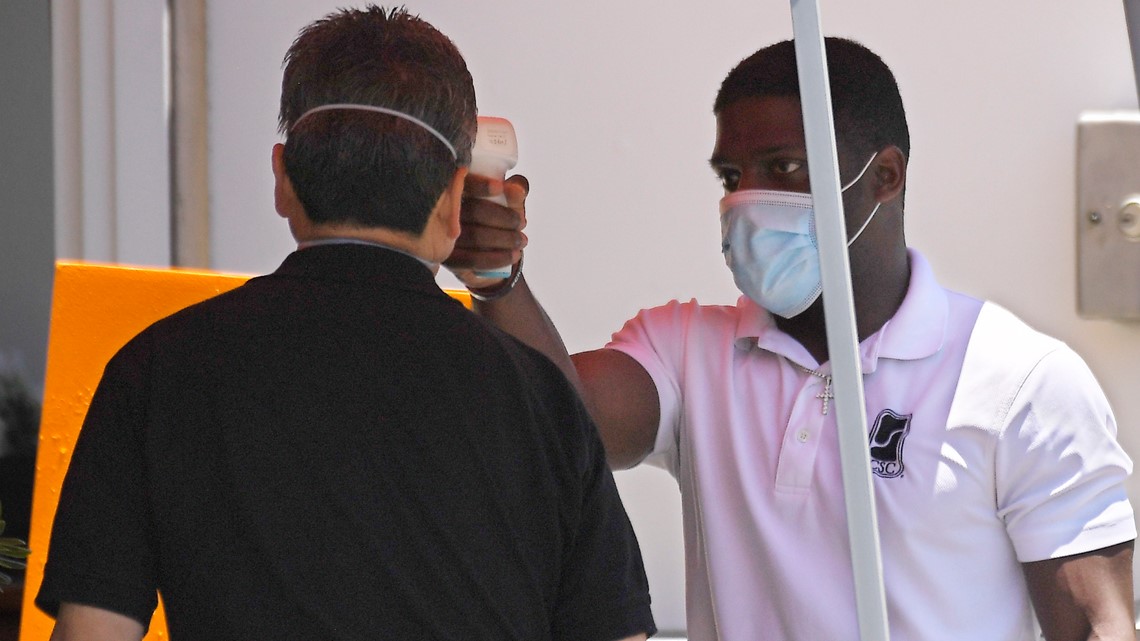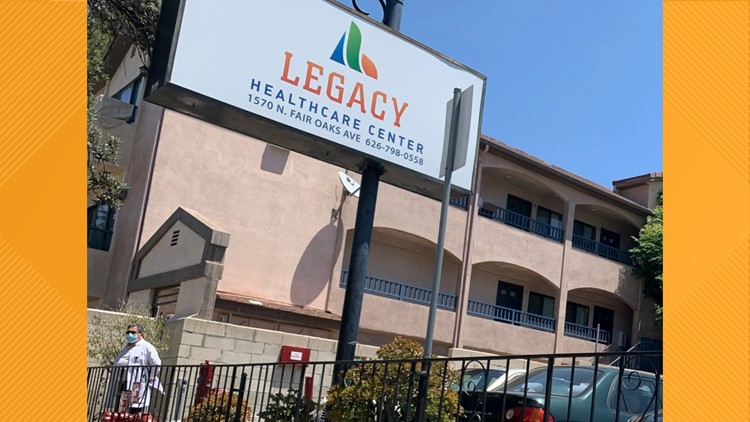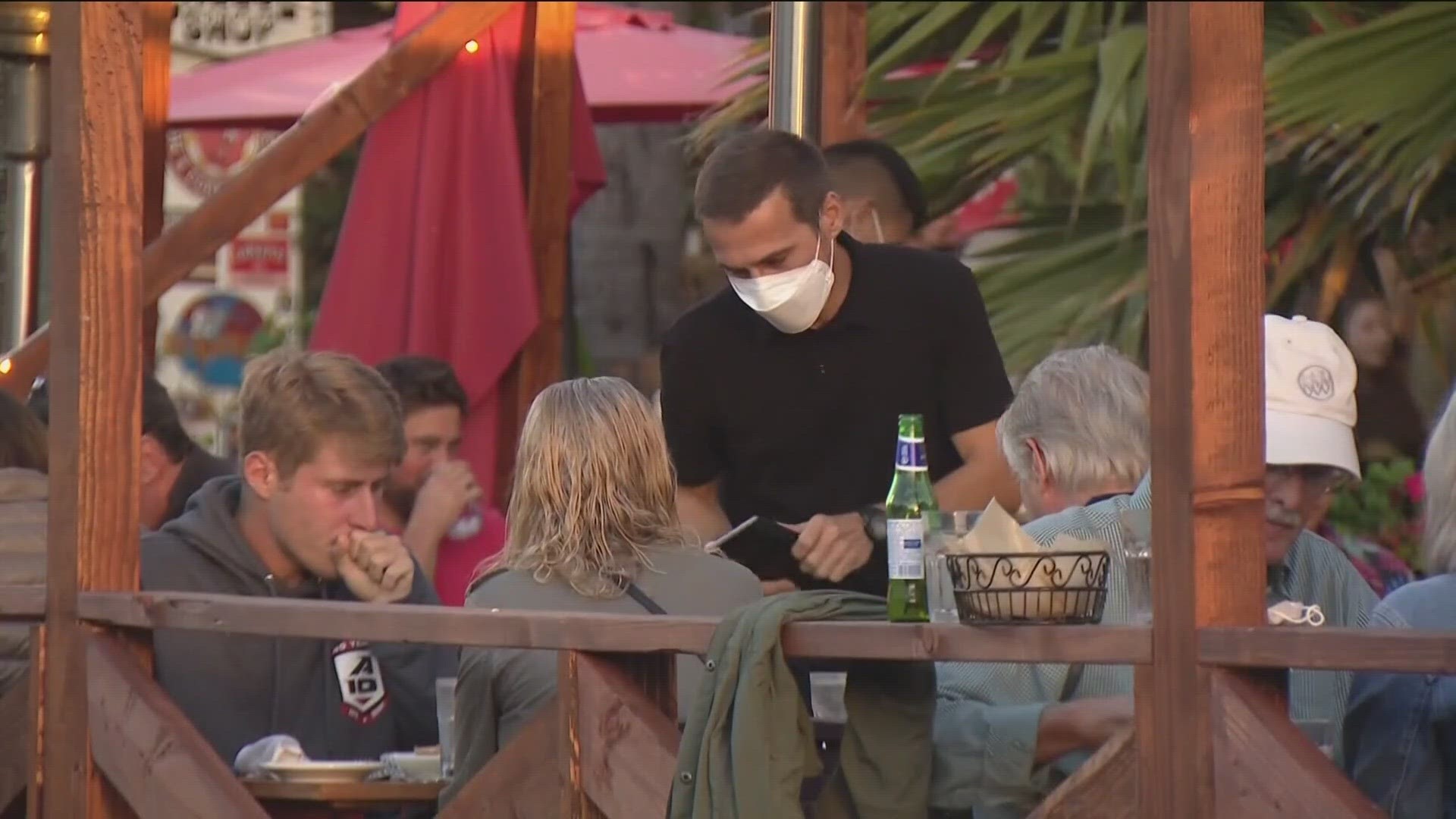CALIFORNIA, USA — His paycheck was more than a week late, and by January, Kritsana Liamkrajang was growing more and more worried about the situation at the Legacy Healthcare and Rose Garden Healthcare nursing homes in Pasadena, where he had worked as a business manager for three years.
Some of his coworkers, also unpaid, simply walked off the job. Vendors called and called to demand the money they were owed.
“If I am not paid soon, I will have to leave my job and find a new job to pay my bills and earn a living,” Liamkrajang declared in a Feb. 5 document filed in Los Angeles County Superior Court. “The environment of my work and the residents’ stay of admission has been increasingly chaotic recently…The way the current operator is managing this facility is an accident waiting to happen.”
By Feb. 5, just days after California’s first COVID-19 case was reported, the 120 residents of both nursing homes faced eviction because the home’s operator couldn’t pay the rent or employees, according to Los Angeles County Superior Court documents.
The problems at the homes weren’t just financial; regulators had sanctioned both homes in recent years for poor patient care and infection control, federal inspection reports show.
In an unusual move, state public health officials took control of both nursing homes, citing the imminent danger to residents. They appointed a temporary manager, got a court order to install a financial receiver, and forced the homes’ operator to relinquish state licenses to run both facilities.
The operator, Dov Jacobs, and his attorney did not respond to interview requests but have denied any wrongdoing in court. Liamkrajang could not be reached for comment.
Most of the elderly, frail residents living at the Legacy and Rose Garden homes never knew how close they had come to eviction as the coronavirus pandemic was spreading across the country. Some live with dementia or mental illness; others require wheelchairs, ventilators or tube feeding. For now, both homes are back in the control of the Southern California family that had operated them for 30 years.
But the episode shows how perilously close to the margin some skilled nursing facilities operate, and how the pandemic can tip them even further into chaos. At least 62 residents and 40 health care workers between the two homes fell ill with COVID-19, state data show. At the Rose Garden home, eight residents died from the disease.
In taking over the Legacy and Rose Garden homes, state public health officials hoped to avoid the fate of another troubled skilled nursing facility, also in Pasadena: in mid-June, state public health officials suspended the license of nearby Golden Cross Health Care and evacuated more than 60 residents, citing serious concerns about the quality of its care.
Golden Cross, just a block down the street from the Legacy home, reported a total of 72 novel coronavirus infections in residents before evacuation; nine died, according to data from the city of Pasadena, which has its own public health department. The state also appointed a temporary manager for that home.


It’s highly unusual for the California Department of Public Health, which regulates nursing homes, to take control of a private facility. But that could become more common in the coming months as nursing homes across the state buckle under the weight of COVID-19 cases.
California public health officials anticipate “an increased need to install temporary managers to remedy dangerous and harmful situations,” according to a recent, widely-distributed letter seeking candidates for the job.
“Facilities in Los Angeles have a history of poor performance and the pandemic is only amplifying those conditions,” said Molly Davies, the Los Angeles County long-term care ombudsman who had raised serious concerns about the Rose Garden and Legacy nursing homes after hearing that their staff weren’t being paid.
How did the homes veer so close to the edge to begin with? Davies and other watchdogs have accused the state for years of anemic oversight of nursing homes and failing to clamp down on operators who repeatedly flout the rules, criticisms supported by a 2018 state audit. In its harsh report, the California state auditor found that the Department of Public Health “has not fulfilled many of its oversight responsibilities,” including a failure to stay on top of nursing home inspections.
As COVID-19 insinuated its way into California, court records and inspection reports provide a rare glimpse into the inner workings of the two troubled homes, located just a half-mile from each other in Pasadena, a quiet, upscale suburb of Los Angeles.
Arlene Rosales just wanted to retire, her Los Angeles attorney, Dawn Coulson, told CalMatters.
The registered nurse from Fullerton had owned and operated the Legacy Healthcare and Rose Garden homes with the help of her family for three decades. In 2016, she leased both to Dov Jacobs and his silent partner, Miriam Taub, through two limited liability companies, Legacy Healthcare Center LLC and Rose Garden Sub-Acute & Rehabilitation Center LLC, according to Los Angeles County Superior Court documents.


Instead, Rosales found herself taking Jacobs and Taub to court over unpaid rent and contract breaches that she felt imperiled the homes’ residents, according to documents she filed in Los Angeles County Superior Court.
It’s not uncommon for nursing home owners, particularly as they get older, to find others to run the facilities for them, Coulson said. Operators manage the home, pay rent to the owner and collect insurance and families’ payments for residents’ care.
Jacobs, a Los Angeles businessman, is listed as operating or having a financial interest in at least 22 nursing homes elsewhere in California as well as Oregon, Idaho and Washington, court records and Medicare documents show. One of his holding companies in November filed for bankruptcy in Washington in a case involving 14 skilled nursing facilities.
In a June 22 response to Rosales’ lawsuit, Jacobs denied Rosales’ allegations and stated that his actions had been in “good faith and fair dealing.”
Taub, of New York, was characterized by her lawyer in court documents filed in Los Angeles County Superior Court as a partner with little day-to-day oversight of the homes. She could not be reached for comment.
Soon after signing the lease, the “Jacobs companies,” as the lawsuit called them, stopped paying some vendors.
“On one occasion, I even had to inform Mr. Jacobs that the gas company had employees on site to shut off our gas if the bill was not paid immediately,” Raymond Pellicer, a former administrator — and Rosales’ son-in-law — wrote in a declaration filed in Rosales’ lawsuit.
By June 2019, the Legacy and Rose Garden operating companies stopped paying rent, the lawsuit states.
Rosales sued in September to evict Jacobs and Taub, his financial partner. She had identified another operator to run the homes, Los Angeles County court documents show.
Pamela Jorgensen of Monrovia knew nothing of the homes’ financial woes at the time. But she was so angry about the care her now-deceased 98-year-old mother, Mary Waddell, received at the Rose Garden facility from July to December last year that she posted a blistering Yelp review with pictures of bruises on her mother’s forehead and arm.
Jorgensen told CalMatters she hired outside home health workers to tend to her mother at the home and help her eat. She said she filed a complaint with the California Department of Public Health detailing her mother’s injuries but that it had not yet been investigated. CDPH does not make complaints public, and there is no public record of any investigation into her complaint.
But inspectors found numerous problems at both Legacy and Rose Garden homes in recent years, including untreated pressure sores, failure to administer medications, understaffing and fire safety violations, according to reports filed by the California Department of Public Health.
Both nursing homes rate only two stars out of five, or below average, on the federally-run Nursing Home Compare website, which evaluates nursing home quality.
State regulators cited the Legacy home five times between 2017 and 2019, fining the home a total of $36,000 for various violations.
A missing door lock and inattentive staffers allowed two Rose Garden residents who had been diagnosed with schizophrenia to leave the facility unsupervised at different times last year, putting them in danger, an August 2019 inspection report shows. The Rose Garden home was cited seven times between 2017 and 2019 and fined a total of $102,000.
In January, the homes’ operating companies had missed two payrolls and were in danger of missing a third, according to Rosales’ lawsuit. More than $1 million in fees to state regulators had not been paid.
And employees started to walk as the homes’ onsite administrator scrambled to hire registry nurses, according to a CDPH letter to the homes regarding the temporary manager’s appointment.
By the end of the month, as the money was running out and the conditions at Rose Garden and Legacy worsened, California public health authorities were turning their attention to a gathering storm: a novel coronavirus originating in Wuhan, China.
While many Californians remained oblivious to the threat, the state warned nursing homes and other health care providers in a Jan. 31 letter that COVID-19 could be spread from person to person. The nation’s first case had been reported 10 days earlier.
The Rose Garden home would see its first COVID-19 case two months later.
Molly Davies, who runs Los Angeles County’s long-term care ombudsman program, recalled her worry in late January when her office received a complaint that the homes’ workers weren’t being paid. The federally-funded program serves as a consumer watchdog for long-term care quality; Davies works for a nonprofit that contracts with the county and city of Los Angeles to provide ombudsman services.
Davies knew that the 54-bed Legacy home often serves psychiatric patients, while the 95-bed Rose Garden home has a “sub-acute” unit for patients requiring complex medical care, including some who needed feeding tubes and ventilators to survive.
“To have any nursing home not have staff be paid and have a precarious workforce is concerning, but when you add a sub-acute – that’s the most fragile population within a nursing home that you can get,” Davies said. “Most of these folks can’t call for help; they’re completely reliant on staff to care for them.”
The California Department of Public Health— tasked with ensuring that staffing requirements are met in nursing homes— would call both facilities to check on their staffing levels.
But Davies thought that taking the facilities’ word for it wasn’t enough oversight. So, in a rare move, she sent her own staffers to visit both homes late at night on four different occasions, where they found at times there weren’t enough staff as required by law to care for the number of residents.
Davies’ staff also fanned out to other homes associated with the same operators to see if workers were being paid, but they found no similar problems, Davies said.
Davies alerted the California Department of Public Health and learned they were aware of the situation.
With the companies still behind on rent, Rosales got the eviction order she’d sought from the court.
On Jan. 31, a Los Angeles County Sheriff served both homes with that notice, according to a state inspection report.
A troubling deadline loomed: the residents, many of whom were bed-bound, could be displaced on Feb. 5 under the eviction order. The nation’s earliest known COVID-19 death occurred a day later, in Santa Clara county.
Inexplicably, the homes hadn’t done any significant planning to transfer residents to other facilities. It took two weeks for the administrator to prepare a plan to transfer residents to eight other nursing homes or area hospitals, according to the CDPH inspection report.
Geriatricians warn that this is a worst-case scenario — uprooting fragile residents and making them vulnerable to “transfer trauma,” a debilitating condition for some who suddenly change environments.
On Feb. 5, the California Department of Public Health appointed a temporary manager, citing “immediate jeopardy” — something the agency has the power to do when the life and safety of residents are immediately threatened.
Rosales didn’t want to evict the residents, but she was worried about conditions at both homes and couldn’t resolve the situation with Jacobs, attorney Coulson said.
“Dov ran the homes into the ground,” Coulson said. “He refused to either give up the homes or find a new operator.”
“Rosales tried everything to get a better tenant and throw Dov out,” added Jerry Seelig, the state-appointed manager.
Seelig came to sort out both homes with checkbook in hand. The state eventually gave him roughly $3 million – money from previous fines paid by nursing homes – to pay employees and vendors, including physical therapists. Seelig, a veteran rescuer of financially troubled health providers, hired registry nurses and other professionals and fired incompetent workers as he stabilized the homes’ finances.
In a report to CDPH, Seelig noted that some of the money that came into the nursing homes’ ledgers was immediately swept into corporate accounts controlled only by Jacobs or his lender.
In an interview, Seelig described it to CalMatters as “a financial pattern of malfeasance.”
“Those residents – their care was being paid for, where was that money going? Medicare and Medicaid didn’t stop paying. Their rent wasn’t being paid? That’s just outrageous,” Davies, the ombudsman, said. “The state came in and (the operators) got to keep their money.”
Miriam Taub’s attorney, Baruch Cohen, declined comment, but in an answer to Rosales’ legal complaint, he described Taub as unaware that Jacobs hadn’t paid the bills.
“Jacobs … has attempted to bury himself and any potential liability under multiple layers of LLC (limited liability corporation) defendant entities,” Cohen wrote. “Taub will be investigating Defendant Dov E. Jacobs’ breaches, frauds and possible embezzlement.”
In a bid to financially stabilize the homes further, state public health officials went to court in March to appoint a financial receiver who had the power to strip the nursing homes’ licenses from the current operator and transfer them to another.
The Rose Garden home reported its first COVID-19 case on March 30, and Legacy reported its first case on April 14, according to Dr. Ying-Ying Goh, public health director and health officer for the city of Pasadena.
Seelig told CalMatters that he informed California Department of Justice attorneys assigned to the state public health agency about the “pattern of malfeasance.”
However, a spokesman for the California Department of Public Health said the matter had not officially been referred to law enforcement.
After Seelig paid the staff and calmed the chaos at both nursing homes, Rosales came out of retirement to operate the facilities once again with her daughter Melissa, said Coulsen, Rosales’ attorney.
Few operators wanted to take on Jacobs’ and Taub’s debts, or those of the homes, Coulson said. Rosales scrambled to gather protective gear for patients and workers as COVID-19 cases started to mount in nursing homes across California in March and April. She had to ask for supplies from neighboring nursing homes, Coulson said.
The state-appointed receiver is still monitoring the finances of both homes. Rosales and her family hope to lease the homes to another operator.
But the months-long turmoil — something that would be hard for nursing homes to weather in normal times — has taken a deep toll on the home’s residents and staff.
Shortly after the temporary manager took over in February, a Rose Garden patient with congestive heart failure, diabetes and dementia died from respiratory failure as workers failed to call 911 in time or notify the patient’s doctor as his condition deteriorated, according to a CDPH investigation report.
Since the pandemic began, more than 100 residents and workers have been infected with COVID-19 at the Rose Garden and Legacy homes. As of July 15, both homes were infection-free, state data show.
State health officials consider the homes’ financial turmoil resolved and do not plan extra monitoring for them, a CDPH spokesman said. An infection control inspection of the Legacy home on June 11 found no violations, but the facility hasn’t been inspected since, according to agency records.
Nursing home watchdogs say during the pandemic, the state public health agency has focused primarily on infection control rather than abuse and neglect, and education rather than sanctions or fines. With visitors, including ombudsmen and family members, mostly banned from going inside California’s nursing homes, independent oversight is painfully lacking, they say.
“Nursing homes are not like other businesses. Owners and operators have the lives of dozens of fragile people in their hands, and mismanagement can kill people,” said Mike Dark, attorney for California Advocates for Nursing Home Reform, a consumer advocacy group.
“State interventions to save the lives of residents should be happening every week, but instead they are tragically uncommon.”
CalMatters.org is a nonprofit, nonpartisan media venture explaining California policies and politics.



